The simultaneous decrease in deposit interest rates will pull down loan interest rates.
The mobilization interest rate level is no longer set at the high level of 6-7%/year as in early February 2025. Savings interest rates have been adjusted down by banks to create conditions to reduce loan interest rates.
The State Bank of Vietnam (SBV) said that as of March 10, 18 commercial banks had adjusted their interest rates down, with the largest reduction being up to 0.9% per year. These include both state-owned banks and some large joint-stock banks. Specifically, BIDV has just reduced interest rates for terms under 6 months by 0.1% per year, down to between 1.6 - 1.9% per year. Techcombank has just reduced interest rates by 0.1 - 0.2% per year for many deposit products depending on different terms.
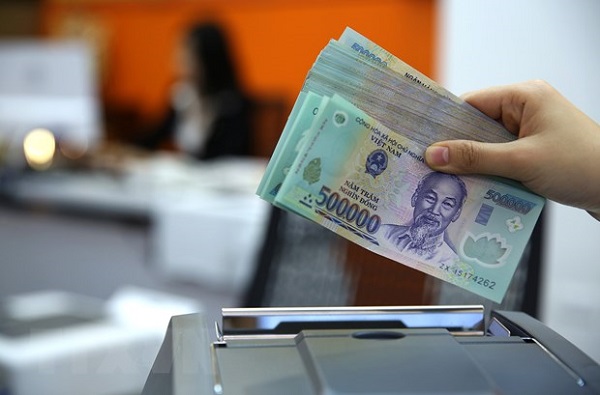 |
Specifically, for regular savings products, Techcombank reduces 0.15% for terms from 1 to 36 months for regular customers and Insprite customers; reduces 0.2%/year for terms from 1 to 5 months for Priority customers and Private customers and reduces 0.15% for terms from 6 to 36 months for Priority customers and Private customers. For online deposit products, counter savings, online savings, flexible principal withdrawal deposits of regular customers and Private customers with deposits of 3 billion VND or more, this bank reduces interest rates by 0.1%/year for terms from 1 to 36 months...
Previously, BVBank reduced interest rates by 0.1 - 0.4% for terms from 6 - 60 months for deposits at the counter; reduced interest rates by 0.1% for terms from 6 - 8 months, 0.25% for terms from 9 - 12 months, 0.35% for terms from 15, 18 months and 0.4% for terms from 24 months for online deposits. From February 25 to March 7, Eximbank continuously adjusted interest rates down for many deposit products. Specifically, for deposits at the counter, the "Long-term deposit with peace of mind" program recorded a reduction of 0.6 to 0.8%/year for terms from 15 - 36 months.
For regular savings for ordinary customers, Eximbank also reduced from 0.1 - 0.2%/year for terms from 12 - 24 months, while customers over 50 years old depositing for terms from 6 - 12 months were adjusted down by 0.1%/year. For online savings channels, interest rates also decreased sharply from 0.2 - 0.8%/year for terms from 6 - 36 months.
VietABank reduces interest rates by 0.1%/year for term deposits from 12 - 36 months, applicable to both counter and online deposits. PGBank reduces interest rates by 0.2%/year for terms from 24 - 36 months. Customers who deposit money at the counter through savings programs or Diamond, Gold, Ruby memberships at LPBank will enjoy a 0.1%/year interest rate reduction for terms from 1 - 60 months. As for online deposits, the 0.1%/year reduction applies to terms from 18 - 60 months.
BacABank reduced 0.1%/year for terms from 1-11 months and 0.2%/year for terms from 12-36 months for counter deposits... Meanwhile, VCBNeo (Bank for Foreign Trade of Vietnam Digital Technology) which has just transferred to Vietcombank also reduced 0.15%/year interest rate for deposits from 6 months or more, applied uniformly to both counter and online deposits. Similarly, NCB adjusted to reduce 0.1%/year for all terms from 1-60 months, applied to both online and counter transactions.
SHB reduced 0.1% for term deposits from 6 - 11 months, term deposits from 13 - 15 months; reduced 0.2%/year for term deposits from 12, 18 months and 0.3%/year for term deposits from 24, 36 months, applied simultaneously to both forms of deposit at the counter and online. Nam A Bank, online deposit interest rates for terms of 1 month and 3 - 5 months decreased 0.3%/year; term deposits from 2 months decreased 0.4%/year and terms from 6 - 36 months decreased 0.1%/year. For counter deposits, the reduction ranges from 0.1 - 0.2%/year for terms from 1 - 5 months.
In just the past week, about 12 commercial banks have reduced their deposit interest rates by 0.1-0.7% per year, and interbank interest rates have also cooled down. However, the issue that businesses and people are concerned about now is how long low lending rates will last, and whether they will decrease further.
After an urgent meeting with the State Bank of Vietnam near the end of February 2025, many commercial banks have simultaneously adjusted their deposit interest rates in a sharp downward direction, aiming to create positive conditions for reducing lending interest rates. At the recent regular Government press conference in February 2025, Permanent Deputy Governor of the State Bank of Vietnam Dao Minh Tu affirmed: The State Bank of Vietnam has determined that the major goal at this time is to maintain stable low interest rates to actively support businesses and people.
In particular, the Prime Minister issued Official Dispatch No. 19/CD-TTg on strengthening the implementation of solutions to reduce interest rates. This is a very timely direction of the Government with a clear message that it wants to reduce lending interest rates and mobilization interest rates. Accordingly, businesses, depositors, and banks need to share simultaneously and synchronously to create conditions for expanding investment in mobilizing loans, effective capital with fast circulation, to create GDP growth of over 8%.
Therefore, the State Bank of Vietnam has immediately directed commercial banks that increased deposit interest rates at the beginning of the year (without increasing lending interest rates) to adjust their interest rates down. In addition, many commercial banks have also launched preferential and suitable credit packages, especially credit packages for social housing and low-income people. The State Bank of Vietnam leaders affirmed: In order to strongly promote economic growth, ensuring the target of GDP growth of the whole country in 2025 reaching 8% or more, the State Bank of Vietnam leaders have committed to closely monitoring the market and requiring credit institutions to publicly and transparently disclose information on lending interest rates, the difference between deposit and lending interest rates, as well as credit packages on their websites. At the same time, this agency will strictly handle violations or unfair competition in the field of interest rates.
On March 9, 2025, Prime Minister Pham Minh Chinh issued Official Dispatch No. 22/CD-TTg on a number of key tasks and solutions to reduce administrative procedures, improve the business environment, and promote socio-economic development with comprehensive instructions. In particular, regarding interest rates, the Prime Minister requested the State Bank of Vietnam to preside over and coordinate with the Ministry of Finance and relevant agencies to closely monitor interest rate developments, resolutely and effectively implement solutions to continue to reduce lending interest rates; continue to manage credit growth in line with economic growth targets, control inflation, direct credit to priority areas, economic growth drivers, social housing, science and technology development, and digital transformation.
Currently, banks have taken action to reduce lending interest rates (for both businesses and individual customers), in which BIDV said that the interest rate BIDV provides on the market closely follows the operating interest rate of the State Bank of Vietnam, which is currently around 4%/year. nAgribank reduced the floor lending interest rate by 0.2-0.5%/year in February, bringing the lending interest rate down to 4%/year for short-term loans and 6%/year for medium and long-term loans.
For the individual segment, banks focus on promoting home loans and consumer loans such as: SHB has a credit package of 16,000 billion VND for home loans with interest rates starting from only 3.99%/year in the first 3 months; Eximbank offers home loans with interest rates starting from only 3.68%/year in the first 36 months for customers aged 22-35; TPBank has a credit package for home loans with preferential interest rates starting from only 3.6%/year and a maximum loan amount of up to 100% of the customer's loan demand. ACB offers home loans to customers aged 18-35 with interest rates starting from only 5.5%/year... but currently the preferential loan interest rate has only been applied in the first phase, so borrowers expect lower and more stable interest rates.
Banks plan to pay huge dividends and increase capital
The season of shareholders' meetings is approaching, which is also the time when banks announce dividend payment plans to prepare for shareholders' approval to increase capital this year.
According to the latest announcements from commercial banks, many units plan to pay dividends in shares at a rate of 15% to 35% - the highest level in recent years. Among them, VietinBank, Vietcombank, BIDV, MB Bank and VPBank, Nam A Bank are notable names with plans to issue thousands of billions of VND in bonus shares to shareholders at a rate of 20-35%.
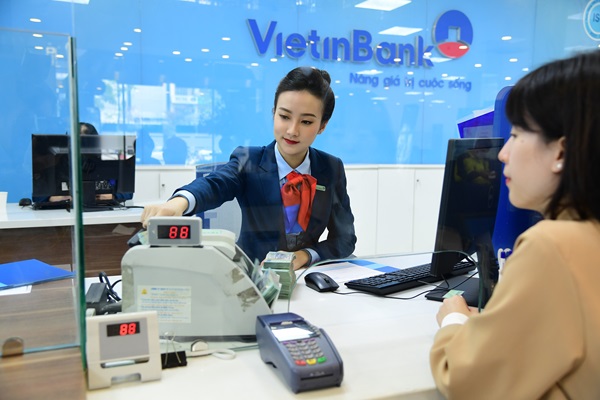 |
Specifically, with pre-tax profit increasing by 10% last year, reaching VND28,829 billion, MB plans to pay dividends of up to 25-30%. Achieving pre-tax profit of VND20,013 billion in 2024, an increase of up to 85%, VPBank not only pays high dividends, but also plans to issue more shares to increase capital, expand retail and consumer finance activities.
HDBank is also a bank that has paid high dividends to shareholders for many consecutive years. At the 2024 General Meeting of Shareholders, this bank presented to shareholders a dividend plan expected to be implemented in 2025 up to 30%, including a maximum of 15% in cash, equivalent to 2024.
Nam A Bank has just announced the documents for the 2025 Annual General Meeting of Shareholders scheduled to take place on March 28, with a profit target of VND 5,000 billion before tax, an increase of 10% compared to 2024, and an expected dividend of 25%. With a 2024 after-tax profit of VND 3,607 billion, the bank plans to submit to shareholders a plan to allocate more than VND 721 billion to funds according to regulations and more than VND 47 billion to other funds, with the remaining undistributed profit of more than VND 2,838 billion.
According to the documents of the 2025 Annual General Meeting of Shareholders, VIB plans to pay a cash dividend at a rate of 7%. The meeting is scheduled to be held on March 27 in Ho Chi Minh City. With the results achieved in 2024, after setting aside funds and paying cash dividends, VIB's remaining consolidated profit is more than VND4,059 billion, and individual profit is more than VND3,963 billion.
In addition to cash dividends, VIB's Board of Directors also proposed to issue nearly 417.1 million shares to existing shareholders, equivalent to 14%, increasing charter capital by nearly VND4,171 billion. In addition, VIB issued 7.8 million bonus shares to employees, equivalent to 0.26%, increasing charter capital by VND78 billion.
After completing the above two components, VIB's charter capital will increase from over VND29,791 billion to over VND34,040 billion, equivalent to a capital increase rate of 14.26%. All additional charter capital will be used by VIB to serve business activities, promote credit granting, invest in liquid assets, invest in facilities, technology infrastructure, expand the branch network, etc.
The three listed state-owned banks, Vietcombank, VietinBank, and BIDV, are all banks with top profit results in the system and have plans to pay high dividend rates. By the end of 2024, these three banks will lead the industry in pre-tax profit results with Vietcombank reaching VND42,236 billion (+2%); VietinBank reaching VND31,758 billion (+27%) and BIDV reaching VND31,383 billion (+14%).
Vietcombank said it will issue more than 2.76 billion shares to pay dividends to shareholders from the remaining profit after tax, after setting aside accumulated funds until the end of 2018 and the remaining profit in 2021, equivalent to an issuance rate of up to 49.5%. The last registration date is March 13, 2025. After the plan is completed, Vietcombank's charter capital is expected to increase by more than VND27,666 billion, from VND55,890 billion to VND83,557 billion, the highest in the current banking system.
Vietcombank also shared its plan to issue 6.5% of its capital to institutional investors (equivalent to 1.3 billion USD), expected to be completed in the first half of 2025. If market conditions are favorable, the charter capital will increase even higher.
Meanwhile, VietinBank's Board of Directors plans to use all remaining profits in 2023, which is more than VND12,500 billion, to pay dividends in shares, helping the Bank increase its charter capital and increase credit growth in the period 2025-2030. BIDV submitted a plan to pay dividends of about 20% in shares, while increasing capital to meet Basel III standards.
It can be seen that paying dividends in shares instead of cash helps banks accumulate equity capital, improve the Capital Adequacy Ratio (CAR) and increase the ability to expand credit.
Regulations prohibiting the seizure of assets by “unethical” means: What do banks say?
The new draft regulations of the State Bank of Vietnam (SBV) require that immoral measures not be applied when seizing collateral. Banks say this concept is difficult to define.
According to the feedback from commercial banks, since Resolution 42/2017/QH14 expired, bad debt settlement has been extremely difficult because banks are no longer allowed to seize collateral. To resolve the difficulties for banks, the Prime Minister has requested the Governor to urgently prepare a dossier on legalizing Resolution 42 to submit to the National Assembly in the upcoming May session.
Recently, the State Bank of Vietnam has solicited opinions on the draft Law amending and supplementing a number of articles of the Law on Credit Institutions to legalize a number of contents of Resolution No. 42/2017/QH14.
According to the draft, the creditor rights of credit institutions are better secured when the right to seize secured assets is recognized (of course, specific conditions must be met).
However, the draft also stipulates: “In the process of seizing secured assets, credit institutions, foreign bank branches, debt trading and settlement organizations, and organizations authorized to seize secured assets must not apply measures that violate the prohibitions of law or are contrary to social ethics.”
Regarding this issue, SHB representative requested the drafting agency to consider adding specific regulations and instructions on measures that credit institutions are prohibited from taking during the process of seizing and handling collateral assets.
Meanwhile, VPBank proposed to remove the phrase: "contrary to social ethics". According to the bank, although this content is defined in the Civil Code, it is difficult to determine, depends largely on subjective assessment, and is likely to affect the rights of credit institutions when seizing collateral. Therefore, it is likely to limit the implementation of the right to seize collateral in practice and affect the debt collection and settlement of credit institutions. If the process of seizing and seizing collateral is not resolute, the property owner will still resist and the effectiveness of seizing and seizing assets will not be promoted.
However, the State Bank did not accept this proposal, because this is a basic principle of civil law.
The Draft Law amending and supplementing a number of articles of the Law on Credit Institutions to legalize a number of contents of Resolution No. 42/2017/QH14 stipulates that one of the conditions for a credit institution to seize secured assets is: "In the security contract or in another document, there is an agreement that the guarantor agrees to allow the secured party to have the right to seize the secured assets of the bad debt when there is a case of handling the secured assets according to the provisions of law".
However, many commercial banks have proposed to have the right to seize collateral even without an agreement between the two parties.
MB representative said that most of the previously signed security contracts did not directly stipulate this content (because at the time the contract was signed, Decree 163/2006/ND-CP dated December 29, 2006; then the 2015 Civil Code also did not stipulate the right to seize collateral. Therefore, to be eligible to apply the right to seize collateral according to the above regulations, credit institutions must negotiate with the borrower to adjust the contract, but customers often do not cooperate (do not sign).
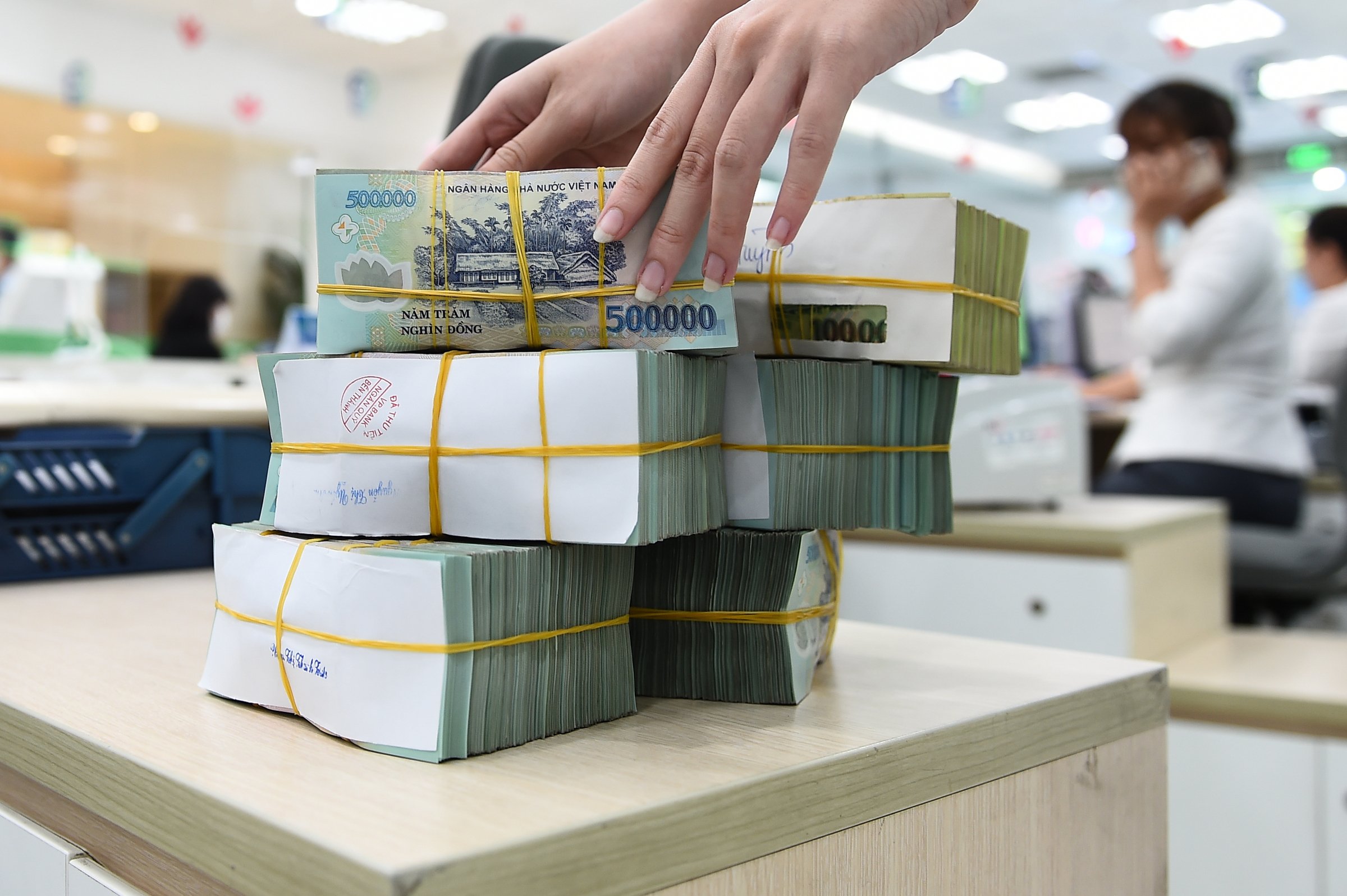 |
Vietcombank representative also made similar recommendations because most customers did not cooperate in signing additional agreements. Therefore, it is very difficult for credit institutions to carry out the seizure of collateral assets according to Article 7 of Resolution No. 42 as well as Article 198a of the Draft Law on Credit Institutions.
“In order to facilitate the parties in establishing an agreement on asset seizure as well as facilitate credit institutions in meeting the conditions for exercising the right to seizure, we respectfully request the State Bank to consider adjusting this condition in the direction of an agreement on the guarantor's consent to the secured party's seizure of the collateral, which can be recorded in the security contract or in other documents,” a representative of VietinBank proposed.
The above proposal of the banks was also not approved by the State Bank. The reason is that according to the provisions of the Constitution and the Civil Code, the property rights of organizations and individuals are one of the rights recognized and protected by law. However, the right to claim debt is also one of the legal rights of the lender. The exercise of that right to claim debt must ensure compliance with certain regulations and procedures and can be based on the agreement of the parties when entering into the contract.
The objective of the Draft Law is not only to deal with signed contracts but also to deal with contracts that will be signed in the future. Therefore, it is necessary for the guarantee contract to have a provision recording the consent of the guarantor for the secured party to exercise the right to seize the collateral to balance the interests between the lender and the guarantor/borrower.
This provision is necessary to ensure that the parties clearly know and freely agree on the content of the contract, especially the provisions on rights and obligations arising from the contract as well as their actions.
Banks own huge profit funds, shareholders are still "hungry" for cash dividends
Owning a profit fund of hundreds of thousands of billions of dong, but in 2025, a series of banks do not plan to pay cash dividends, instead paying dividends in shares at an extremely high rate to increase capital.
By the end of 2024, the banks' undistributed profit "store" will be very large. Of which, the largest is Vietcombank with undistributed profit reaching 110,678 billion VND (retained profit in 2024 alone is 33,831 billion VND).
At VietinBank, undistributed profits by the end of 2024 reached VND58,390 billion. Techcombank, MB and BIDV also owned over VND40,000 billion in undistributed profits, respectively.
The remaining group of banks with the next largest undistributed profit fund are: Sacombank (VND 28,426 billion), VPBank (VND 24,000 billion), ACB (VND 23,733 billion), SHB (nearly VND 15,000 billion), HDBank (nearly VND 13,000 billion)...
Although retained earnings are very large, most banks currently do not plan to pay cash dividends but mainly pay dividends in shares.
Specifically, according to Vietcombank's announcement, tomorrow (March 13) is the last registration date to close the list of shareholders to issue shares to pay dividends from the remaining profit after tax, after setting aside accumulated funds until the end of 2018 and the remaining profit in 2021. Accordingly, the bank will issue more than 2.76 billion shares to pay dividends to shareholders, equivalent to an issuance rate of up to 49.5%.
Vietcombank also wants to use VND22,770 billion of remaining profit after setting aside funds in 2023 and retained profit in 2024 to pay stock dividends.
Another big player, VietinBank, also plans to submit to the 2025 Annual General Meeting of Shareholders a plan to pay stock dividends at a rate of 44.64% to increase capital. The source of dividend payment is from remaining profit after tax, funds and cash dividends for the period 2009 - 2016.
Previously, VietinBank said it had received the opinions of the State Bank of Vietnam and the Ministry of Finance to allow it to retain all of its 2022 profits (VND11,678 billion) to increase capital through stock dividends. In addition, the bank also plans to increase its charter capital by VND12,330 billion from the remaining profits from 2021 and the remaining accumulated profits up to the end of 2016. The bank also wants to use all of its retained profits from 2023 and 2024 to increase capital.
VietinBank has proposed that competent authorities approve the policy allowing the bank to retain all annual profits from 2024 to 2028 to increase capital, improve financial capacity, and expand credit growth space.
In the private commercial joint stock banking sector, only a few banks have announced their 2024 profit distribution plans, most of which will pay dividends in shares to increase capital.
Specifically, in 2025, Nam A Bank plans to increase its charter capital by more than VND 4,281 billion through the issuance of shares to pay dividends and issuance of shares under the employee stock option program (ESOP). In particular, regarding the plan to issue shares to pay dividends, the bank plans to issue an additional 343.1 million shares, equivalent to a rate of 25%, helping to increase its charter capital by more than VND 3,431 billion. The source of issuance is from equity capital (undistributed profit after tax and other funds as prescribed by law as of December 31, 2024 based on the audited consolidated financial statements for 2024).
VIB is the first bank to announce a plan to pay cash dividends this year, however, the dividend rate is still mostly in shares. Accordingly, this year, VIB plans to pay cash dividends at a rate of 7%, issue bonus shares to existing shareholders at a rate of 14% and issue 7.8 million ESOP shares to employees.
In addition to VIB, this year there may be some more banks paying cash dividends such as VPBank, HDBank...
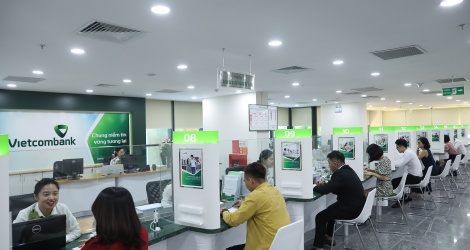 |
Specifically, HDBank leaders said that this year the bank will pay dividends equivalent to last year (last year HDBank paid dividends in cash and shares). At the 2024 Annual General Meeting of Shareholders, Mr. Ngo Chi Dung, Chairman of VPBank's Board of Directors, affirmed that he will pay cash dividends for 5 consecutive years.
In 2024, 10 banks have implemented plans or announced policies to pay cash dividends to shareholders, namely VIB, ACB, HDBank, MB, VPBank, Techcombank, Eximbank, SHB, TPBank and MSB.
However, this year, the number of banks paying cash dividends may be less because most banks are facing pressure to increase charter capital and improve CAR ratio to serve the high credit growth demand in the coming period.
According to Mr. Ivan Tan, Director, Financial Institution Ratings, S&P Global Ratings, Vietnamese banks are under great pressure to increase capital. The capital adequacy ratio (CAR) of Cambodian banks is 22.6%, of Thai banks is 20.5%, of Chinese banks is 15.6%. Meanwhile, in Vietnam, the CAR of banks is 12.4%. When Vietnamese banks want to have high credit growth, they need a lot of capital to ensure the above ratio.
Due to the thirst for capital, it is understandable that Vietnamese banks pay dividends in shares, but experts also believe that this reduces the attractiveness of Vietnamese bank stocks, which is one of the reasons why foreign investors are less interested.
“Many foreign shareholders are not satisfied because Vietnamese banks have paid few cash dividends in recent years, quite different from other countries,” said Mr. Ivan Tan.
Billion-dollar debt trading "market": Foreign investors begin to join the game
The billion-dollar bad debt trading "market" is expected to become more bustling thanks to the participation of foreign investors.
In the recently issued Official Dispatch No. 22/CD-TTg, the Prime Minister requested to encourage foreign banks to participate in the process of handling bad debts, restructuring weak credit institutions and promoting investment in Vietnam.
In fact, the Vietnamese bad debt market has an attractive enough scale in the eyes of foreign investors (according to data from the State Bank of Vietnam, the total outstanding bad debt of the whole industry is at over VND 227,000 billion, or nearly USD 9 billion). Recently, many foreign investors such as OK Debt Trading Company Limited, Welcome Debt Trading Company Limited, Korea Asset Management Company (KAMCO) ... have been interested in exploring investment opportunities in the debt trading market in Vietnam.
However, at present, debt trading is still taking place between the Vietnam Asset Management Company (VAMC), the Vietnam Debt Trading Company Limited (DATC) and debt trading companies under domestic commercial banks (AMC). Attracting foreign investors to participate in the bad debt "market" has been proposed very early, but has not been implemented effectively.
Dr. Nguyen Quoc Hung, General Secretary of the Vietnam Banking Association, said that there are many reasons why the debt trading market has not yet developed. That is, there are not many participants in the market (credit institutions still mainly sell debt to VAMC and DATC).
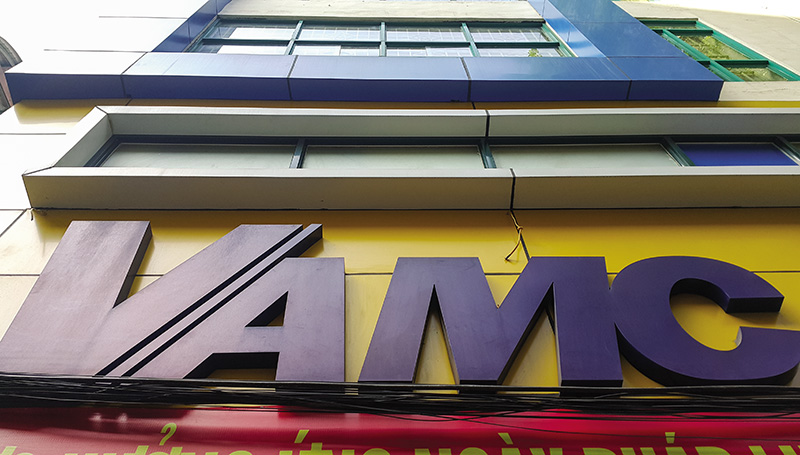 |
In addition, credit institutions have difficulty in determining whether the debts that credit institutions buy from organizations/individuals with the function of trading and buying debts (not credit institutions) can apply Resolution 42/2017/QH14 to handle debts and handle secured assets or not? Tools and services to support the debt trading market are still lacking and weak. The registration of changes to the secured party after credit institutions sell bad debts is facing many difficulties, causing risks for investors.
The leader of a bank’s debt trading company said that currently, information about bad debt is basically transparent and complete. The main reason why the “market” cannot develop is that the legal corridor does not ensure safety for investors and is not attractive to foreign investors.
Dr. Nguyen Tri Hieu said that the experience of successfully handling bad debt in other countries is to have a proper debt trading market and to attract foreign capital to participate in this market. Currently, the scale of bad debt in Vietnam is enough to create an attractive debt trading market for international investors, unfortunately the legal corridor has not been able to attract investors.
Currently, the VAMC Debt Exchange has developed a relatively diverse database, connected with many investors, and provided consulting services to investors, including foreign investors. Mr. Vu Ngoc Minh, Director of the VAMC Debt Exchange, said that since its establishment, the Exchange has invited foreign investors to participate. Investors are given maximum conditions to learn about the source of goods.
“Recently, Korean and Chinese investors have been very interested in Vietnam’s debt trading market. We have introduced a very large portfolio to Korean investors, they have considered and are conducting transactions to buy several large debts,” said Mr. Minh.
Recently, through KAMCO, many Korean investors have expressed their interest in the Vietnamese bad debt market. Previously, KAMCO requested VAMC to provide a list of borrowers and collateral so that Korean investors can study and access within the framework of Vietnamese law.
It is known that Korean investors are particularly interested in unfinished real estate projects, chains of companies with potential production and business activities, but facing temporary difficulties in capital flow... Through debt purchase, Korean investors can increase their presence in the real estate market and some other industries in Vietnam.
In addition to Korean investors, Chinese and ASEAN investors are also particularly interested in Vietnam's bad debt market. Collectius Group - a partner providing restructuring and bad debt trading services in Asia with headquarters in many countries, including Vietnam - is actively promoting its operations in Vietnam. The Group's representative said that in Vietnam, Collectius has served more than 195,000 customers through many bad debt trading transactions and is negotiating with many different financial institutions to diversify its investment portfolio.
According to the leader of a debt trading company, although foreign investors are very interested in the Vietnamese bad debt market, information about bad debts provided by credit institutions and VAMC is clear and transparent, successful transactions depend on many factors, especially the legal framework. Therefore, the legalization of Resolution No. 42/2017/QH14 of the National Assembly on piloting the handling of bad debts of credit institutions will greatly support the development of the debt market and attract foreign investors.
Need to balance between interest rates and exchange rates
Associate Professor, Dr. Tran Hung Son, Director of the Institute for Banking Technology Development Research (University of Economics and Law, Ho Chi Minh City National University) said that to reduce lending interest rates and stimulate credit demand, banks must save costs, but also need to balance interest rates and exchange rates.
What is your opinion on current and future interest rates?
Following the direction of the Prime Minister and the State Bank of Vietnam (SBV), the mobilization interest rate level has been adjusted down by banks, but in the long term, in my opinion, interest rates will follow the supply and demand of capital in the market. Moreover, we must also balance the problem between interest rates and exchange rates, especially when the "health" of the USD is forecast to not stop increasing.
Reducing lending interest rates depends on reducing banks' capital costs. Therefore, it is difficult for banks to maintain high mobilization interest rates in the current context, but they must make efforts to reduce costs, thereby reducing lending interest rates and stimulating capital demand.
What is the current room for monetary policy easing, sir?
Monetary policy is unlikely to have much room to loosen further, as Vietnam’s credit growth to GDP is at a high level. For example, in 2024, the credit to GDP ratio will be around 136%. Meanwhile, BIS research (2024) on emerging economies in Asia shows that if the credit to GDP ratio exceeds 130%, credit will restrain growth.
Vietnam's average economic growth over the past 20 years reached its highest level when the credit/GDP ratio reached nearly 100% and tended to decline when the credit/GDP ratio exceeded this threshold. Therefore, the ability of monetary policy to promote further capital growth is also considered a limitation. Perhaps we should combine monetary policy and public spending policy, especially spending related to social security issues such as social housing development.
But in reality, the rate of loan capital usage of Vietnamese enterprises is quite large?
If facing difficulties in accessing capital, businesses tend to seek alternative sources of funding, such as internal funding, trade credit, non-bank credit and personal networks... Compared to countries with the same level of development, the internal funding rate of Vietnamese businesses is lower, but access to finance is better.
Additional analysis results show that when financial constraints move from lower to higher levels, the average ROA (return on assets) decreases by about 2%, and the revenue/investment ratio decreases by 33 VND. Regarding interest rates, the more financially constrained a business is, the higher the cost of borrowing it has to pay.
Therefore, if the financial constraints for businesses can be reduced, we can expect a boom in long-term investment, increasing economic growth for Vietnam. However, the scale of bank credit is approaching a threshold point and will continue to increase, which may have a negative impact on economic growth.
The capital market is still difficult and has not recovered. How can we balance the problem of capital supply for the economy, avoid dependence on credit capital from the banking system as well as reduce pressure on monetary policy?
Underdeveloped capital markets limit the long-term financing of enterprises. Enterprises still depend on credit and internal financing for investment, so there is a need to improve access to finance for small and medium-sized enterprises. Access to finance is not currently strictly linked to growth, but it is likely to be a key constraint when the economy enters a high growth phase.
However, to develop the capital market, helping businesses mobilize medium and long-term capital, avoiding dependence on bank credit capital, it is necessary to develop the stock and bond markets. For the stock market, the actual scale is still low, estimated at only about 60% of GDP and the room that can be promoted to mobilize and supply capital is still large.
The bond market has also developed, but stricter regulations are needed. Therefore, more time and solutions are needed to recover and develop this market.
Cheap capital flows into social housing: No speculation and price increases
A large amount of cheap capital has been prepared by banks, ready to be poured into social housing projects while supply remains scarce. Experts warn that solutions are needed to ensure that the injection of additional capital does not inflate housing prices.
The real estate market is receiving many boosts to recover. Currently, the Government has introduced a series of solutions to develop social housing. Banks are also competing fiercely to launch low-cost home loan packages to stimulate individual demand for home loans.
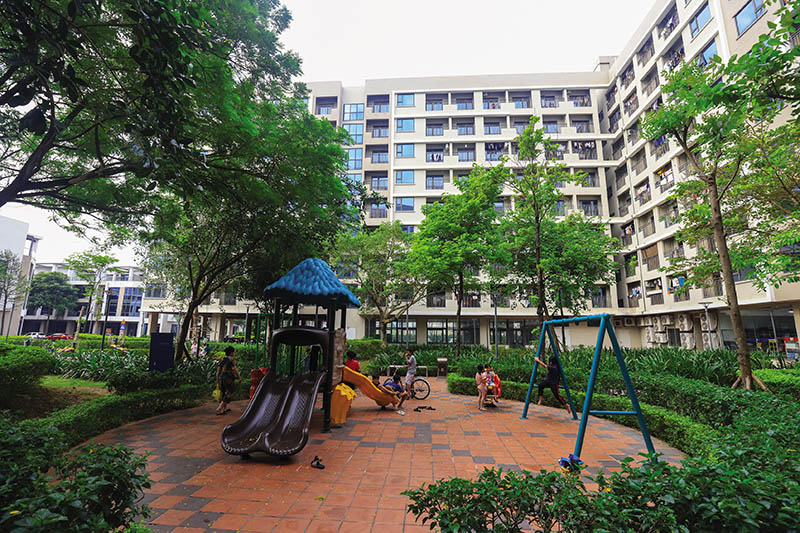 |
Recently, a series of banks such as LPBank, SHB, HDBank, ACB... have launched loan packages with interest rates from only 3.88%/year to 5.5%/year to support home loans. Customers can borrow up to 90-100% of the property value, with a maximum loan term of 35-50 years and a principal grace period of 24-60 months.
As for social housing, the VND145,000 billion credit package is being actively disbursed. Mr. Pham Toan Vuong, General Director of Agribank (the leading bank in social housing lending) said that this bank is currently providing credit to 13 investors and nearly 300 individual customers buying houses in the projects, with a total credit amount of nearly VND4,000 billion and outstanding debt reaching over VND1,000 billion. The bank is approaching and considering providing credit for 5 projects, with a total expected credit amount of nearly VND3,000 billion.
According to Ms. Nguyen Thi Hong, Governor of the State Bank of Vietnam (SBV), for the VND145,000 billion package and the credit lending program for young people under 35 years old, the SBV has called on banks to participate, the preferential interest rate when lending to these programs is 1-3% lower than the normal lending interest rate.
“Under the direction of the Prime Minister, we have called on 9 banks to register about 45,000 - 55,000 billion VND to lend to young people for a period of 15 years, with an interest rate about 1-3% lower. However, most young people only need to rent a house, not buy a house, so we need to re-evaluate to have appropriate policies. As for the 145,000 billion VND credit package, banks are lending at an interest rate of 6.1-6.6%/year, which is the same as the lending interest rate for the poor,” said the Governor of the State Bank of Vietnam.
Although banks have acted quickly in response to the Government's policy of developing social housing and affordable housing, many experts believe that the banks' response is not enough. For this segment to recover, real estate investors must be one step ahead to create supply. In the context of scarce supply, while banks increase money injection, it is very likely that the opposite effect will occur.
According to Dr. Nguyen Quoc Hung, General Secretary of the Vietnam Banking Association, it seems that investors have not taken specific and practical actions to support people who want to buy houses at reasonable costs, but on the contrary, they have continuously pushed up prices. Therefore, even though people can borrow with preferential interest rates, the cost of buying a house is still getting higher and higher, far beyond their ability to pay.
“I am a little concerned that when banks create conditions for home loans with low interest rates, house prices will increase even more (due to more money being pumped in while supply cannot meet demand). We need to be careful not to let cheap capital increase house prices,” Mr. Hung warned.
Need to mobilize total capital resources for social housing
The disbursement speed of the 145,000 billion VND preferential credit package for social housing loans may be faster in the coming time, but according to experts, to "stimulate" this segment, first of all, barriers to the social housing supply side must be removed.
Accordingly, many real estate investors proposed allowing localities to designate contractors and investors; increasing the standard profit for businesses by 15-20%; creating land funds for social housing development; piloting land allocation without bidding...
Regarding capital, to invest in 1 million social housing units, we cannot rely solely on bank credit. Dr. Le Xuan Nghia, an economic expert, said that the VND145,000 billion package is commercial capital, lent by bank capital mobilized from the people, so it must ensure profit, and cannot maintain too low interest rates. To develop social housing, the decisive preferential capital source must be budget capital.
Prof. Dr. Hoang Van Cuong, former Vice President of the National Economics University, proposed to establish a National Housing Fund using the money from the 2% land use fee contribution of social housing projects paid by enterprises. This fund will be used to invest in developing social housing in the future.
This expert also believes that the National Housing Fund should apply a mechanism for people to contribute before registering to buy a house. Accordingly, priority criteria can be based on the level of contribution and time of participation. This method not only helps mobilize capital effectively but also helps clearly classify between those who are able to buy, rent-purchase or rent a house, instead of having to manually evaluate each case.
Corporate bond market "thirsty" for big players
The corporate bond market is not diversified, so the capital investment rate of investment funds is not high. This is also the reason why this market cannot be vibrant.
Mr. Le Hong Khang, Director of Analysis at FiinRatings, said that in 2025, the capital mobilization demand of enterprises and the economy will be very large. Corporate bonds are an important medium and long-term capital mobilization channel for enterprises, but have not attracted a variety of institutional investors.
“Currently, Vietnam’s corporate bond market relies mainly on commercial banks, while lacking the participation of pension funds, insurance companies and mutual funds – important investor groups in developed markets,” said Mr. Khang.
In fact, since last year, commercial banks have almost dominated the entire corporate bond market in both the role of seller and buyer. The active participation of banks has increased the size of this market, but the fact that banks are “alone in the market” shows that the depth of the market needs to be improved.
According to FiinRatings, in developed countries, the participation of institutional investors who are not financial institutions is very large, accounting for 40-50% of the corporate bond market, but in Vietnam, this figure is only 10-15%. Although life insurance funds, non-life insurance funds, pension funds... in our country are holding up to 90 billion USD in total assets, the amount of capital participating in the corporate bond market is still low.
Many domestic and foreign investment funds also believe that the depth of Vietnam's corporate bond market will only improve when there is a mechanism to attract this capital flow.
“Currently, the number of individual investors holding corporate bonds accounts for a large proportion, while institutional investors hold a small proportion, creating an imbalance. In particular, a very important segment of the market, insurance funds, has not been promoted. Even the investment fund of TCBS Securities Company is facing difficulties when investing in corporate bonds due to lack of supply, we can only invest in listed bonds,” said Mr. Nguyen Tuan Cuong, Deputy General Director of TCBS Company.
Regarding the diversification of products and investor base in the bond market, the representative of the State Securities Commission said that issuers need to have more new products to attract investors, especially green bonds and listed bonds. In addition, domestic investment funds also need to cooperate more with foreign investment funds to participate in the bond market.
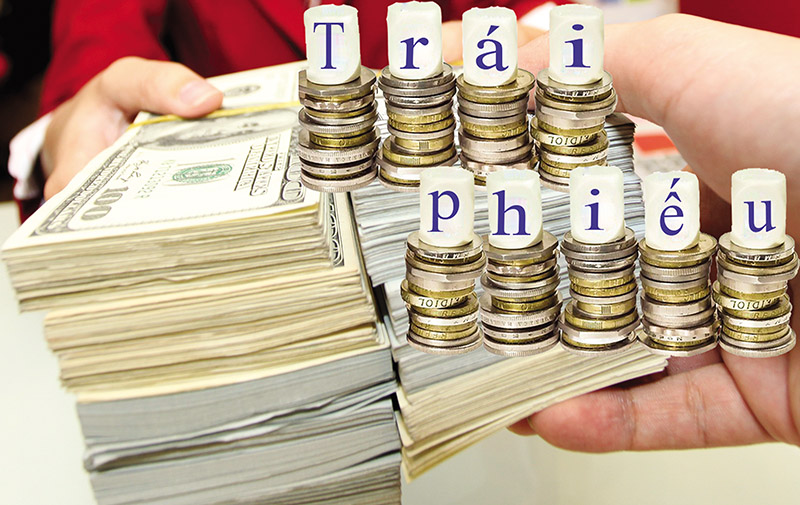 |
Recently, the management agency has introduced many solutions to increase transparency in the corporate bond market, remove barriers to market participation for investment funds, and research policies for new investment fund models...
Corporate bond issuance in February 2025 was almost frozen due to no issuance. However, experts said that there are 3 reasons why corporate bond issuance in 2025 will still grow positively.
Firstly, credit institutions increased bond issuance to increase medium- and long-term capital to meet the high credit growth demand in 2025 - expected at 16%, while complying with the State Bank's safety ratios. The recovery of real estate and the Government's promotion of policies to implement the Power Plan VIII have made the issuance of real estate bonds and renewable energy bonds vibrant again.
Second, the market has recently seen a number of multi-industry enterprises issue long-term bonds, bonds with independent credit ratings, and guaranteed by international organizations. This shows that investor confidence will return if bonds are more transparent.
Third, public bond issuance will improve thanks to new regulations on issuance conditions and credit rating requirements.
Mr. Nguyen Quang Thuan, Chairman of FiinRatings, said that the new regulations on private and public issuance of corporate bonds coming into effect will help improve the quality and depth of the corporate bond market, turning corporate bonds into a medium and long-term capital mobilization channel for businesses.
Source: https://baodautu.vn/cho-no-xau-ty-usd-bat-dau-thu-hut-von-ngoai-ngan-hang--khung-van-khong-chia-co-tuc-tien-mat-d254520.html














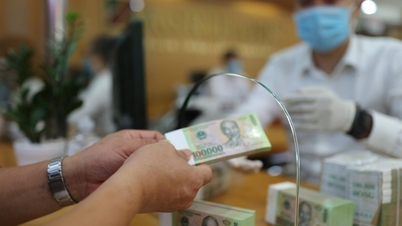

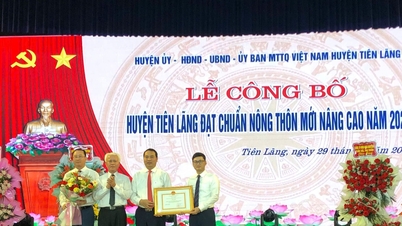













































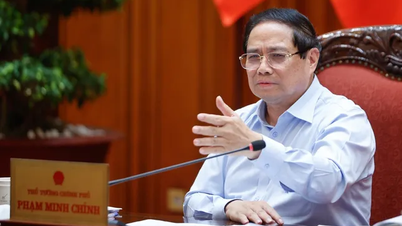


















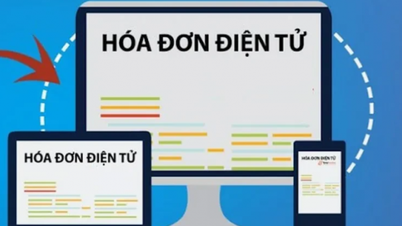


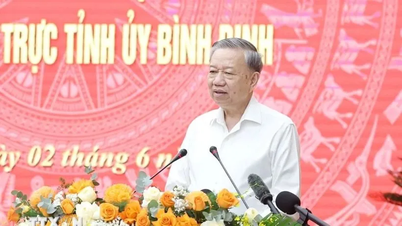

















Comment (0)